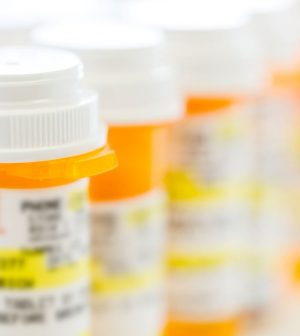- Could Your Grocery Store Meat Be Causing Recurring UTIs?
- Are You Making This Expensive Thermostat Error This Winter?
- Recognizing the Signs of Hypothyroidism
- 10 Strategies to Overcome Insomnia
- Could Artificial Sweeteners Be Aging the Brain Faster?
- Techniques for Soothing Your Nervous System
- Does the Water in Your House Smell Funny? Here’s Why
- Can a Daily Dose of Apple Cider Vinegar Actually Aid Weight Loss?
- 6 Health Beverages That Can Actually Spike Your Blood Sugar
- Treatment Options for Social Anxiety Disorder
One Type of Blood Pressure Med May Help Prevent Post-Stroke Epilepsy

Some people develop epilepsy after surviving a stroke, as the injury they’ve sustained causes scarring and disorganized electrical activity in their brains.
But one type of blood pressure medication seems to help stroke survivors avoid post-stroke epilepsy (PSE), according to a first-of-its-kind study presented Friday at the annual meeting of the American Epilepsy Society in Los Angeles.
Patients taking angiotensin receptor blocker (ARB) drugs appear to be much less likely to develop PSE than those on other blood pressure medications, results showed.
ARB drugs work by decreasing the effects of angiotensin, a protein that causes blood vessels to narrow, researchers explained in background notes.
Blocking this protein might decrease inflammation and improve blood flow in the brain, reducing the risk of seizures, researchers theorized.
“Our study uniquely focused on how effective different blood pressure medications are at preventing PSE in the real world,” said co-lead researcher Dr. Giacomo Evangelista, a resident in neurology at the Epilepsy Center at G. d’Annunzio University of Chieti-Pescara in Italy.
“Understanding which antihypertensive medications help prevent complications such as PSE can lead to better patient outcomes,” Evangelista added in a meeting news release.
For the study, researchers recruited 528 patients with high blood pressure who’d suffered a stroke. None of the patients had epilepsy at the time of their stroke.
All of the participants had been taking some type of blood pressure medication, researchers said, and 194 were taking two or more.
Overall, about 7% of the participants in the study developed post-stroke epilepsy, which falls in line with real-world observations that 6% to 8% of stroke victims develop PSE, researchers said.
Those patients taking blood pressure meds other than ARBs had a dramatically higher risk of post-stroke epilepsy, results show:
-
120% more like with beta blockers
-
110% more likely with calcium channel blockers
-
65% more likely with ACE inhibitors
-
60% more likely with diuretics
Researchers speculate that calcium channel blockers and beta blockers might increase the likelihood of seizures by making the brain excessively excitable, while ACE inhibitors might increase inflammation in the brain.
“These findings highlight the importance of personalized medicine, particularly in managing blood pressure in stroke patients,” said co-lead researcher Dr. Fedele Dono, a neurologist at the Epilepsy Center at G. d’Annunzio University of Chieti-Pescara. “Further research in more patients is necessary to confirm these findings and explore the underlying mechanisms in more detail.”
Findings presented at medical meetings should be considered preliminary until published in a peer-reviewed journal.
More information
The Stroke Association has more on post-stroke epilepsy.
SOURCE: American Epilepsy Society, news release, Dec. 6, 2024
Source: HealthDay
Copyright © 2026 HealthDay. All rights reserved.










